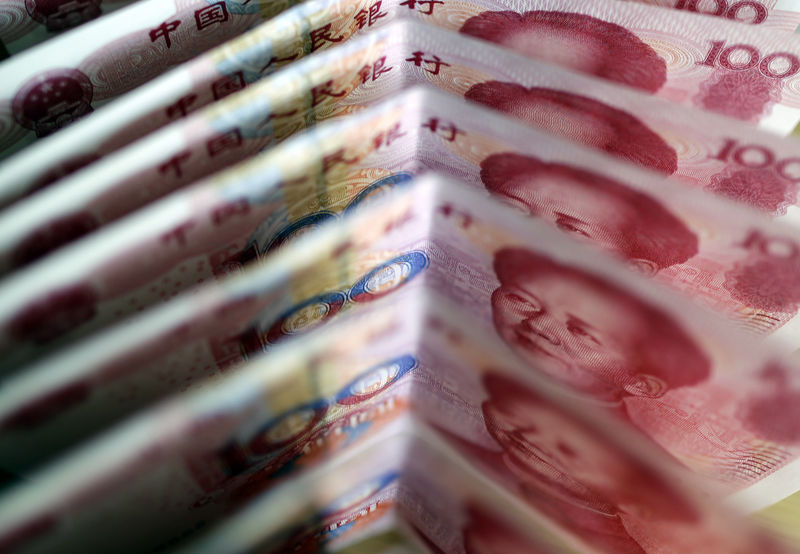SHANGHAI/HONG KONG (Reuters) - China's yuan slumped to a fresh 11-year low against the dollar on Monday and stocks fell as the Sino-U.S. trade war sharply escalated, threatening to inflict more damage on the world's largest economies and weigh further on global growth.
In Hong Kong, a weekend flare-up in violence during anti-government protests added to pressure on share prices.
The onshore yuan fell 0.6% in early trade to 7.15 per dollar, its weakest since February 2008 and its second biggest one-day drop of the month. The offshore yuan fell to a record low of 7.1850, before regaining some ground to around 7.1595.
The Chinese authorities have allowed the tightly-managed yuan to fall some 3.6% so far this month as trade tensions between Beijing and Washington worsened, sparking fears of a global currency war. It was trading around 7.1419 by 0330 GMT.
On Friday, U.S. President Donald Trump announced an additional duty on some $550 billion of targeted Chinese goods, hours after China unveiled retaliatory tariffs on $75 billion worth of U.S. goods.
"This tit-for-tat escalation shows how unlikely a trade deal and de-escalation have become," Louis Kuijs, of Oxford Economics, wrote in a note late on Sunday.
"The impact of the new tariffs on China’s economic growth will be sizeable," he said.
Oxford now expects China's economic growth could fall significantly below 6% next year, even assuming more policy support measures.
The benchmark CSI300 Index (CSI300) sank 1.2% by the midday break, while the Shanghai Composite Index (CSI) fell about 1%. Chinese 10-year Treasury futures rallied 0.3% in early trade on Monday.
China's central bank had been seen trying to stabilise the yuan in recent weeks after allowing a sudden slide in its value in early August following new U.S. tariff threats. On Friday, traders thought it was signalling a floor at the 7.1 level.
But Ken Cheung, chief Asian FX strategist at Mizuho Bank in Hong Kong, expects further weakness in the yuan for the rest of this year following the latest dramatic escalation.
"The PBOC has not yet signalled its bottom line for the yuan," Cheung said, referring to the People's Bank of China, the central bank.
"And given the United States is holding its presidential election next year, the situation is unlikely to deteriorate too much as that could trigger a backfire."
In Hong Kong, the Hang Seng Index (HSI) dropped more than 3% in morning trade as investor confidence continued to weaken amid the deteriorating trade outlook and the latest flare-up in violent anti-government protests in the city.
It was trading down 2.7% at 0333 GMT.
"The sentiment towards local companies is really bad. People have been pessimistic on the rental and tourism outlook and what happened over the weekend doesn’t help," said Alex Wong, director at Ample Finance Group in Hong Kong.
Protests on Sunday saw some of the fiercest clashes yet between police and demonstrators since violence escalated in mid-June over a now-suspended extradition bill that would have allowed Hong Kong people to be sent to mainland China for trial.
With the economic outlook souring rapidly, analysts expect more growth measures from Beijing in coming weeks and months.
On Monday, the Chinese central bank injected 150 billion yuan worth of funds into the financial system via its medium-term lending facility, or MLF. It kept the interest rate on the instrument unchanged at 3.3%.
Markets had expected the PBOC to keep key rates steady this week, but a cut is expected by mid-September after a policy review by the U.S. Federal Reserve, as Beijing steps up efforts to lower borrowing costs to support growth.
Investors are closely watching to see if Beijing will resort to more aggressive easing measures as the trade war drains confidence, dents business profits and hurts overall growth.
